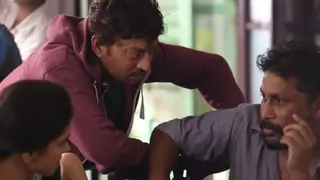Looking at Tibet through filmmaker Tsetan's camera lens
New Delhi, July 7 (IANS) Meet Sonam Tsetan, one of the many young Tibetan filmmakers living in exile outside their country, who is trying to redefine the political turbulence in Tibet through his lens and narrative.
Published: Monday,Jul 07, 2008 10:40 AM GMT-06:00
New Delhi, July 7 (IANS) Meet Sonam Tsetan, one of the many young Tibetan filmmakers living in exile outside their country, who is trying to redefine the political turbulence in Tibet through his lens and narrative.
'We, the new generation of Tibetan filmmakers, are looking at our homeland that we left behind through the eyes of the Tibetan youths in exile,' the Delhi-based filmmaker told IANS here.
A television journalist by profession, Tsetan's film was screened at the India International Centre that has organised a Tibetan film festival July5-9.
Cinema has been a powerful vehicle that has taken the Himalayan country to the world outside. Several filmmakers, including some big names from Hollywood, have taken up the strife-torn nation as their subject.
Tsetan's signature movie is 'Tsampa to Pizza' - a 45-minute telling docu-feature on the new generation of Tibetans in exile and their dilemmas that he made in November 2007. He is one-movie-old and is currently working on his next project, 'The Girl From China'.
For the uninitiated, his movie needs a little contextual analysis.
'Tsampa is a traditional Tibetan dish cooked with barley and pizza is the country's hottest fast food. The title should tell you that the movie is about the journey of the youth bred on Tsampa in their homeland in exile to the culture of pizzas - modernity,' the filmmaker explained.
The storyline of the movie is small. 'Tsampa...' is about two friends in college, Tenzin and Dhondup, who share a room and similar interests in girls, music and sports. But they are clueless about their own identity. Born to Tibetan parents in exile, they have learnt to accept their adopted homeland - Dharamsala in Himachal Pradesh - as their own and assimilate its culture.
'I have tried to raise some serious questions in the movie. Like why Tibetan youth are not consistent in their struggle for freedom? Are they losing focus of their goals and priorities in their race to follow in the footsteps of the West and the contemporary culture?' he said.
'Our school teachers in Dharamsala used to say that we were the future of Tibet,' he added.
Tsetan said that he has tried to answer these questions in his own way in the movie.
'I think one of the most important factors that breeds inconsistency in the struggle for a free Tibet among the youth is poor management in terms of money, time and resources. The second is the western pop culture, which is a distraction. Deep down, our youth have a huge sense of nationalism but just can't give practical shape to it, but there is no one to help them at home or outside,' he said.
'Indian parents are so concerned about their children. If a kid asks his parents for money, they would want to know what he would do with the money. This instils a sense of accountability and management. Our parents are very affectionate, but they would never question us about what we would do with the money.
'As a result, money and resources are often mismanaged,' the filmmaker said.
Tsetan added that the 'affinity of Tibetan youth to Western culture saps energy and the motivation to carry on the struggle'.
'For instance, if we are called to take part in a demonstration at Jantar Mantar, many of our boys would fritter away their energy visiting discos and drinking the night before. There is no one to advise them,' he rued.
Tsetan's new movie 'The Girl from China' is a political commentary based on his personal interactions with a dancer from China who has settled in India.
'I showed her some Tibetan movies which she liked. And only then did she begin to talk. I shot queries like 'suppose you had a Tibetan boyfriend, what would you do?' The movie is set in Shanghai, Delhi, Agra and Dharamsala.'
His new film also portrays how Tibetans in exile often go out of their way to help Chinese travellers in distress.
'And in this case, a Tibetan welfare organisation helped a Chinese tourist who had lost all his baggage return home by donating Rs.15,000 for his passage,' he said.
The message, as Tsetan says, is that 'there is no enmity between Tibetan and Chinese youth at a personal level despite the political tussle between the leaderships of the two nations'.
'My script is ready,' the filmmaker said. All he needs is a producer.
But the fledgling Tibetan movie industry still has a long way to go. 'Filmmaking has yet to pick up because anything cerebral puts off Tibetan youth,' Sonam laughed.
(Madhusree Chatterjee can be contacted at madhu.c@ians.in)
Join Our WhatsApp Channel
Stay updated with the latest news, gossip, and hot discussions. Be a part of our WhatsApp family now!
Join NowYour reaction
 Nice
Nice Great
Great Loved
Loved LOL
LOL OMG
OMG Cry
Cry Fail
Fail















Post a comment